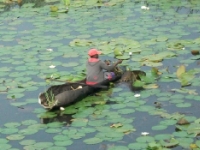Iowa Company Linked to Refugee Abuses In Tanzania

AgriSol, an Iowa company, has been linked to plans to evict 160,000 Burundian refugees from Katumba and Mishamo in western Tanzania, according to "Lives on Hold," a new report by the Oakland Institute.
Kilimo Kwanza which translates as "Agriculture First" is a recent Tanzanian government initiative to promote a "greener revolution" through agricultural modernization and commercialization via public-private partnerships. The program was launched in August 2009 by Tanzania's President Jakaya Kikwete.
Enter Agrisol Energy LLC's - an Iowa-based investment company that specializes in agribusiness. The company's goal is to find "underdeveloped global locations that have attractive natural resources but lack best-in-class agricultural technology, farming techniques, equipment and management." The company opened talks with the government to start large-scale crop cultivation, beef and poultry production, and biofuel production in three "abandoned refugee camps" - Lugufu in Kigoma province (25,000 hectares) and Katumba (80,317 hectares) and Mishamo (219,800 hectares), according to company business plans.
A 2011 investigation by the Oakland Institute, a California based NGO, revealed that the refugee camps were not abandoned but very much occupied by Burundian refugees who have lived in the area for 40 years.
Agrisol does not deny this. Henry Akona, AgriSol Tanzania's director of communications, says that the company officials were initially told that plans had been made to move the refugees from the settlements. "We were considering those areas a few years ago, but we have suspended any plans because the land is occupied," Akona told the Daily Iowan. "We should have done better homework."
Oakland Institute profiled Sembuli Masasa, the father of seven children, who had been farming in Katumba for 39 years who told researchers: "They are giving us $200, ask us to dismantle our own house and to move to a place we have never seen before."
"Initially promised citizenship, the residents still await their papers, conditional on them vacating their homes and lands in order to make way for the foreign investor," says Anuradha Mittal, executive director of the Oakland Institute. "The residents have been banned from cultivating crops including perennial crops such as cassava or building new homes and businesses, leaving them with no other option but to consider moving."
The new report alleges human rights abuses of the refugees "which range from the burning down of houses and crops and violation of their freedom of speech to inequities in social services."
Akona disputes charges that the company is responsible for the fate of the Burundians. "AgriSol has absolutely nothing to do with the refugees in Katumba and Mishamo," he told the Daily Iowan.
The Oakland Institute report has created a storm in Iowa, notably for Bruce Rastetter, CEO of AgriSol Energy who worked with Iowa State University's College of Agriculture and Life Sciences in Ames, Iowa, to get support for the deal.
Faced with growing questions, the university pulled out in February 2012
Iowa Citizens for Community Improvement, a community group in Des Moines, Iowa, has filed an official conflict of interest complaint against Rastetter with the Iowa Ethics and Campaign Disclosure Board, and are lobbying for Bruce Rastetter to be removed as Iowa Board of Regents President Pro Tem.
The Tanzania project is part of a new phenomenon that activists are calling "land grabbing." GRAIN, a global agricultural think tank based in Barcelona, estimates that at least 50 million hectares of good agricultural land - enough to feed 5 million families in India - have been transferred from farmers to corporations in the last few years alone.
Economists say that governments have to be very careful about inviting corporations to manage vast swathes of land in poor countries. "If it's done properly, and if African governments take care of their countries and their populations, this can be a big benefit," says Jeffrey Sachs of Columbia University told Dan Rather reports. "If they in effect give away these valuable resources, then what happens is these scarce resources benefit some other part of the world. And Africa is left even worse off than it was before."
- 116 Human Rights



